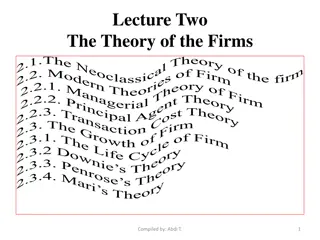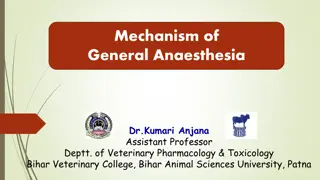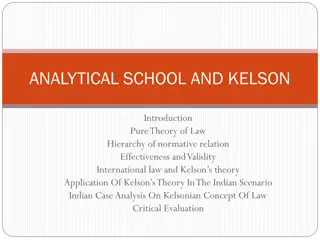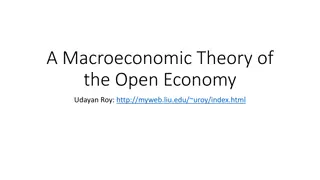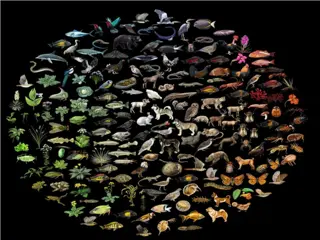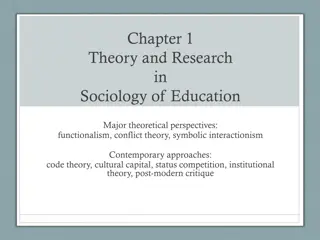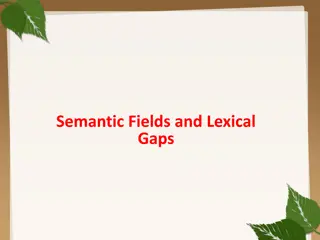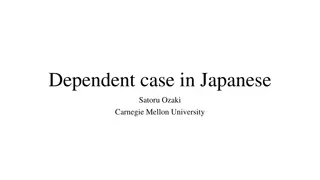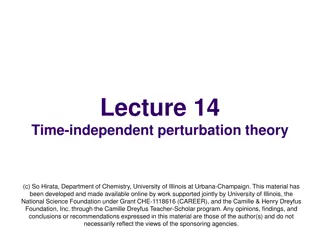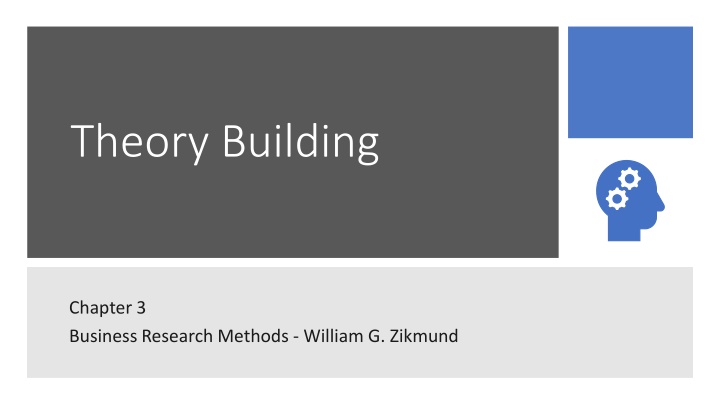
Understanding Theory Building in Business Research
Explore the concept of theory building in business research, including the definition of theory, goals of theory, research concepts and constructs, and research propositions and hypotheses. Learn how theories are developed, tested, and applied in the field of business research.
Download Presentation

Please find below an Image/Link to download the presentation.
The content on the website is provided AS IS for your information and personal use only. It may not be sold, licensed, or shared on other websites without obtaining consent from the author. If you encounter any issues during the download, it is possible that the publisher has removed the file from their server.
You are allowed to download the files provided on this website for personal or commercial use, subject to the condition that they are used lawfully. All files are the property of their respective owners.
The content on the website is provided AS IS for your information and personal use only. It may not be sold, licensed, or shared on other websites without obtaining consent from the author.
E N D
Presentation Transcript
Theory Building Chapter 3 Business Research Methods - William G. Zikmund
What is a Theory? What is a Theory? A theory consists of a coherent set of general propositions that offer an explanation of some phenomena by describing the way other things correspond to this phenomena. A theory is a formal, testable explanation of some events that includes explanations of how things relate to one another. A theory can be built through a process of reviewing previous findings of similar studies, simple logical deduction, and/or knowledge of applicable theoretical areas. If a theory does not hold true in practice, then that theory holds no value. Sudha Bhagavatheeswaran, Department of Information Technology, SIES College of Arts, Science & Commerce (Autonomous)
Goals of Theory Predicting Understanding Understanding Enables us to predict the behavior or characteristics of one phenomenon from the knowledge phenomenon Gain an understanding of the relationship among various phenomena. of another . Sudha Bhagavatheeswaran, Department of Information Technology, SIES College of Arts, Science & Commerce (Autonomous)
Research Concepts and Constructs A concept or construct is a generalized idea about a class of objects, attributes, occurrences, or processes that has been given a name. Concepts are the building blocks of theory. Concepts abstract reality. Ladder of abstraction:- Organization of concepts in sequence from the most concrete and individual to the most general. Sudha Bhagavatheeswaran, Department of Information Technology, SIES College of Arts, Science & Commerce (Autonomous)
Research Concepts and Constructs Abstract level: In theory development, the level of knowledge expressing a concept that exists only as an idea or a quality apart from an object. Empirical level: Level of knowledge that is verifiable by observation. Latent construct:- A concept that is not directly observable or measurable, but can be estimated through proxy measures. Eg :- Job performance, customer satisfaction, and risk aversion. experience or Sudha Bhagavatheeswaran, Department of Information Technology, SIES College of Arts, Science & Commerce (Autonomous)
Research Propositions and Hypotheses Research Propositions and Hypotheses Propositions are statements concerned with the relationships among concepts. A proposition explains the logical linkage among certain concepts by asserting a universal connection between concepts. A hypothesis is a formal statement explaining some outcome. A hypothesis is a proposition that is empirically testable. When one states a hypothesis, it should be written in a manner that can be supported or shown to be wrong through an empirical test. For example, using the color of the background for a Web site, the researcher may use theoretical reasoning to develop the following hypothesis: H1: A web site with a blue background will generate more sales than an otherwise identical Web site with a red background Sudha Bhagavatheeswaran, Department of Information Technology, SIES College of Arts, Science & Commerce (Autonomous)
Research Propositions and Hypotheses Research Propositions and Hypotheses Empirical testing means that something has been examined against reality using data. Retirement benefits and intention to leave are variables, reflecting the concepts of employee treatment and employee loyalty. Operationalizing the variables. When the data are consistent with a hypothesis, we say the hypothesis is supported else, not supported. Sudha Bhagavatheeswaran, Department of Information Technology, SIES College of Arts, Science & Commerce (Autonomous)
Theory Building Theory Building Deductive reasoning The logical process of deriving a conclusion about a specific instance based on a known general premise or something known to be true. Inductive reasoning The logical process of establishing a general proposition on the basis of observation of particular facts Sudha Bhagavatheeswaran, Department of Information Technology, SIES College of Arts, Science & Commerce (Autonomous)
Scientific Method Proposal of an explanation of the phenomenon and statement of new problems raised by the research Assessment of relevant existing knowledge of a phenomenon 01 07 Formulation of concepts and propositions Analysis and evaluation 02 of data 06 Acquisition of 03 Statement of hypotheses 05 meaningful empirical 04 data Design of research to test the hypotheses Sudha Bhagavatheeswaran, Department of Information Technology, SIES College of Arts, Science & Commerce (Autonomous)










